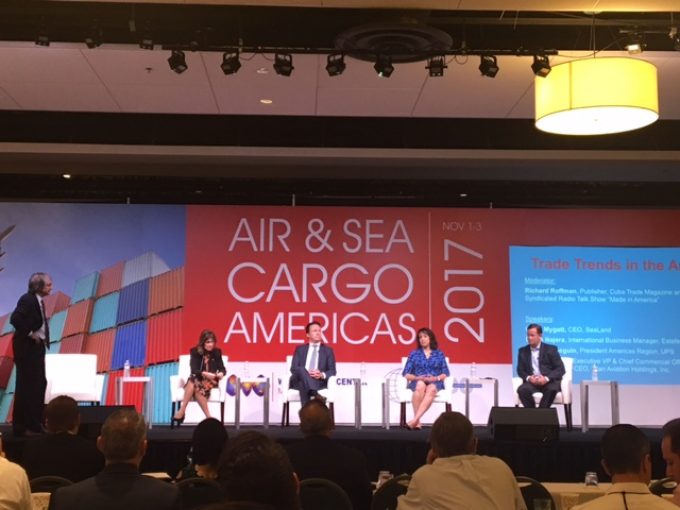UPS fee changes: 'another way of raising shipping charges to offset costs'
UPS is keeping its customers on their toes with a barrage of charge and fee ...

E-commerce offers significant opportunities to the logistics industry, including ocean carriers, according to retailers.
Frank Diaz, executive vice president of Price Smart, a US warehouse chain and retailer and one of the top 50 container exporters in the US, urged the logistics industry to help it compete with etailers.
“E-commerce is generally difficult to make profitable,” he told delegates at Air & Sea Cargo Americas in Miami yesterday.
“You have to do all the things the customer used to do – go to ...
Volcanic disruption at Anchorage could hit transpacific airfreight operations
Macron calls for ‘suspension’ – CMA CGM's $20bn US investment in doubt
Forwarders stay cool as US 'liberation day' tariffs threaten 'global trade war'
Shippers snap up airfreight capacity to US ahead of tariff deadline
De minimis exemption on shipments from China to the US will end in May
Tighter EU import requirements proving 'a challenge' for forwarders
Looming Trump tariffs will create 'a bureaucratic monster' for Customs

Comment on this article
Julia Chernykh
November 03, 2017 at 1:10 pmThanks for the article! I agree with the author. And I also want to notice that e-commerce really is now one of top business directions. But many people are afraid of the idea to start your own e-commerce marketplace. Why? Why are they not ready to try? In my opinion, it is related to the fear of losing by making high stakes. But is the investment of big money a key element in running an e-commerce startup? No, it isn’t! Please believe me! Try the new free online tool that will help you to calculate all important steps on the way to creating the successful online marketplace! It’s called Marketplace Platform Advisor, and it’s completely free. Find out more here: https://roobykon.com/blog/posts/64-marketplace-platform-advisor-is-here
Najma Qureshi
January 31, 2018 at 11:34 amYes, its true. This increased emergence of ecommerce across the glob has raised the demand for the shipping services and even for the sea freight as well.
Shannon Weiss
October 08, 2018 at 12:16 pmYeah, it is extremely true that e-commerce paved way for more cargo transportation via air / water and created many business opportunities as well. It is calculated that about 90% of goods reaches customers through sea routes. But now a days, sea freights are facing a major concern, i.e. delayed shipping and associated heavy costs. Delay may be due to various factors. It can be cargo clearance delay, climatic changes, system errors, etc. Among this, cargo clearance delay can be avoided if we give a little care. Many logistics and transportation companies are nowadays using applications which can ease the process of customs clearance. For more details, visit: https://www.zerone-consulting.com/Case-Study/Sea-Freight-Logistics-Auto-Port-Declaration.html . This case study explains about an application to automate port declaration for sea freight logistics. The system facilitates submission of all necessary documents required for customs clearance to be submitted before reaching destination port / even before commencing the sail. System also helps the carriers to monitor whether their submissions are accepted / rejected/ needs any re submission. Customs officials can calculate entry charges to the port for the carriers and if they wish, they can do online payment / not, they can settle the payment while reaching the port. If any security issues are found, carriers can know that earlier and can fix the issue asap. Thus, all together, the system helps faster, safer and efficient submission of port declaration, lower response time by customs officials regarding paper clearance, better unloading of cargo and invoice by obeying the maritime rules. Wide use of modern technological systems in sea freight shipping should be encouraged in order to optimize operating cost.